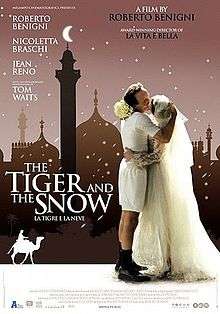The Tiger and the Snow
| La tigre e la neve | |
|---|---|
 | |
| Directed by | Roberto Benigni |
| Written by |
Roberto Benigni Vincenzo Cerami |
| Starring |
Roberto Benigni Jean Reno Nicoletta Braschi Emilia Fox |
Release dates |
|
Running time | 118 minutes |
| Country | Italy |
| Language |
Italian English Arabic |
La tigre e la neve (English: The Tiger and the Snow) is a 2005 Italian movie starring and directed by Roberto Benigni.
The film is a romantic comedy set in contemporary Rome and in occupied Baghdad during the Iraq War. The story, inspired by the fairy tale "Sleeping Beauty", features singer-songwriter Tom Waits as himself in recurring dream sequences, and a surprise ending. The opening scene is a celebration of love, with an abundance of poetic references mentioned in the closing credits.
Plot
Rome, March 2003. Attilio de Giovanni (Roberto Benigni), a comical but talented literature professor and the divorced father of two teenage girls, is hopelessly in love with Vittoria (Nicoletta Braschi, Benigni's wife in real life), a writer who is the subject of a recurring dream, featuring a surreal wedding ceremony with poetry verses in the background and the wife suddenly turning into a kangaroo. Attilio's strenuous courtship is unsuccessful, yet he does not lose hope, despite the fact that Vittoria obviously does not share the same feelings. She tells him that she will agree to marry him only when she sees a tiger walking on the snow.
Vittoria leaves to go to Iraq to write the biography of the poet Fuad (Jean Reno), a close friend of Attilio who is returning to his country after 18 years in exile in France. Vittoria is wounded during the Iraq War and Attilio manages to reach Baghdad with the intention of saving her life. He finds Vittoria in an Iraqi hospital lying in a coma; like thousands of Iraqis, she is in danger of dying from lack of medicine. Fuad directs Attilio to an old Iraqi pharmacist, who suggests ancient treatments that keep her alive. Attilio locates scuba gear (to provide oxygen) and even "a weapon of mass destruction" (a flyswatter),[1] one example of the film's anti-war stance.[2]
Attilio then runs the risk of going to the Italian Red Cross HQ in Iraq, obtains medical supplies by posing as a doctor, then brings medicines back to Baghdad. The medical supplies enable Vittoria to make a complete recovery, but when Attilio goes to Fuad's house to tell him about this triumph over adversity, he finds that Fuad has hanged himself. Fuad had earlier had a short soliloquy on how "his eyes no longer...", but Attilio had not picked up on because he was frantically trying to make the glycerine mixture to save Vittoria. Just before Vittoria emerges from her coma, Attilio is captured by the U.S. Military and is mistaken for an Iraqi insurgent, but he is nevertheless freed and able to return to Italy.
In the final scenes it is revealed that Vittoria is Attilio's ex-wife. They are separated in this story, perhaps because of his tumultuous over-abundant energy and insane diversions, (along with earlier transgressions with another woman). Several times we see Attilio in awkward visits to Vittoria and their children, and obviously he is still hopelessly in love. (He proved this in the most extreme way- finding her and somehow managing to save her life in war-torn Iraq.) On the same day Attilio returns to his country, there is an animal breakout at the Rome zoo. Vittoria, driving her car, stops to see an escaped tiger in the middle of the road under falling, snow-like pollen from the jasmine trees. In the final scene of the film, even though Attilio won't admit that he is the "wonderful stranger who saved her", Vittoria suddenly recognizes his familiar way of brushing her cheek in the same manner that "the stranger" had touched her when she was lying unconscious in the hospital, and the way her necklace (that he took from her in Iraq, for safekeeping) dangling from his neck touches her face.
Cast
- Roberto Benigni: Attilio de Giovanni
- Jean Reno: Fuad
- Nicoletta Braschi: Vittoria
- Emilia Fox: Nancy
- Giuseppe Battiston: Ermanno
- Tom Waits: himself
- Andrea Renzi: Doctor Guazzelli
- Gianfranco Varetto: Attorney Scuotilancia
- Chiara Pirri: Emilia
- Anna Pirri: Rosa
- Martin Sherman: American Soldier
Connections to La Vita è bella
Several references to Life Is Beautiful are scattered throughout the film. First and foremost is the Benigni-Braschi pairing (in real life, husband and wife). However it is usual for the pair to co-star together. The first half of the film deals with Benigni's character courting Braschi's, and the second part has them separated by a war. Benigni is even taken prisoner at one point. Benigni's attempts at saving his wife are reminiscent of his scenes cheering up his son at the concentration camp. Benigni's movie Pinocchio is also alluded to, particularly Braschi's character, the Blue Fairy: at one point her husband asks her to wear a blue robe. Later on her husband straps a blue scuba mask to her eyes, remarking how beautiful the color blue contrasts her skin.
References
External links
- The Tiger and the Snow at the Internet Movie Database
- The Tiger and the Snow at Rotten Tomatoes
- Movie review (Stylus magazine)